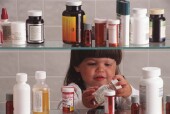
FRIDAY, June 25 (HealthDay News) — It’s a common find in medicine cabinets and bathroom drawers: a prescription vial containing years-old medication or an over-the-counter cold remedy that’s embarrassingly past its sell-by date.
But unless they’re spring-cleaning, many people don’t bother throwing away these items. And when they do, people often turn to the toilet and flush the products away.
Both behaviors are big mistakes.
Keeping out-of-date medications in the house poses dangers to everyone in the family. And flushing old medications down the toilet can be harmful to the environment.
Old drugs and remedies kept moldering in the medicine cabinet may not be able to help you when you need them the most.
“The big reason to dispose of these medications would be that they may be ineffective. They lose potency over time,” said Jeffrey C. Delafuente, an associate dean and professor in the School of Pharmacy at Virginia Commonwealth University. “After the expiration date, there’s no guarantee they’ll be of any benefit.”
Someone with severe asthma, for instance, might reach for an inhaler during an asthma attack only to find that it’s full of expired medication, Delafuente said. “That could put them in the emergency department, or they could die from the attack,” he said.
Old medications also pose an overdose hazard. Statistics from the American Association of Poison Control Centers show that most childhood poisonings are due to ingestion of over-the-counter medicines or prescription drugs.
So, if you should get rid of medications after their expiration date, why not flush them?
Because biologists have found that flushed medications are getting into the ecosystem and have the potential to cause environmental damage, said Tiffany Parson, a biologist with the U.S. Fish & Wildlife Service.
“We’re concerned about aquatic habitats, and medications getting into them,” Parson said. “We don’t want medications flushed directly into the sewer system. If they are flushed, there is that potential that they could get more directly into an aquatic ecosystem, compared with putting them in the landfill.”
The chemicals in medications can cause hormonal changes and affect aquatic organisms at the cellular level, Parson said. Drugs intended to lower people’s cholesterol, for instance, can retard metabolism and growth in fish, and antipsychotic and anxiety medications can impact behavior, growth and reproduction.
“Fish may be expressing different hormones that they wouldn’t normally,” Parson said. “We don’t want any kind of impurity in any of our waters. Pharmaceuticals are just one of those potential substances.”
However, people shouldn’t depend on a waste treatment plant to remove pharmaceutical chemicals from wastewater, either. “Most treatment facilities don’t have the technology to filter out these substances from sewage,” Parson said.
That’s led experts to suggest that the best way to get rid of expired medications is to throw them away in the household trash.
Take-back programs do exist — with expired drugs being collected and disposed of by pharmacies, government agencies or community groups — but most aren’t meant for consumers, Delafuente said.
“At the retail or pharmacy level, they can have a pick-up service come, collect the old medications and dispose of them, usually by incineration,” he said.
However, some medications are just too risky to be put in the trash and should, instead, be flushed, according to the U.S. Food and Drug Administration. These include controlled substances such as methadone, OxyContin, Percocet and Dilaudid. Flushing such drugs, the agency says, ensures that they won’t fall into the wrong hands. Some drugs on the list could be fatal if taken by someone who doesn’t need the medication, the FDA warns.
Medications disposed of in the trash, though, can be disguised, Delafuente said. Simply crush the pills or tablets or add kitty litter, coffee grounds or sawdust to the trash bag. “That way it doesn’t look attractive to anyone or any thing,” he said.
The FDA also suggests putting the mixture in a sealed container as an extra measure of protection against animals ingesting the drugs should they scrounge through the trash.
More information
The U.S. Food and Drug Administration has a list of medications that should be flushed.

